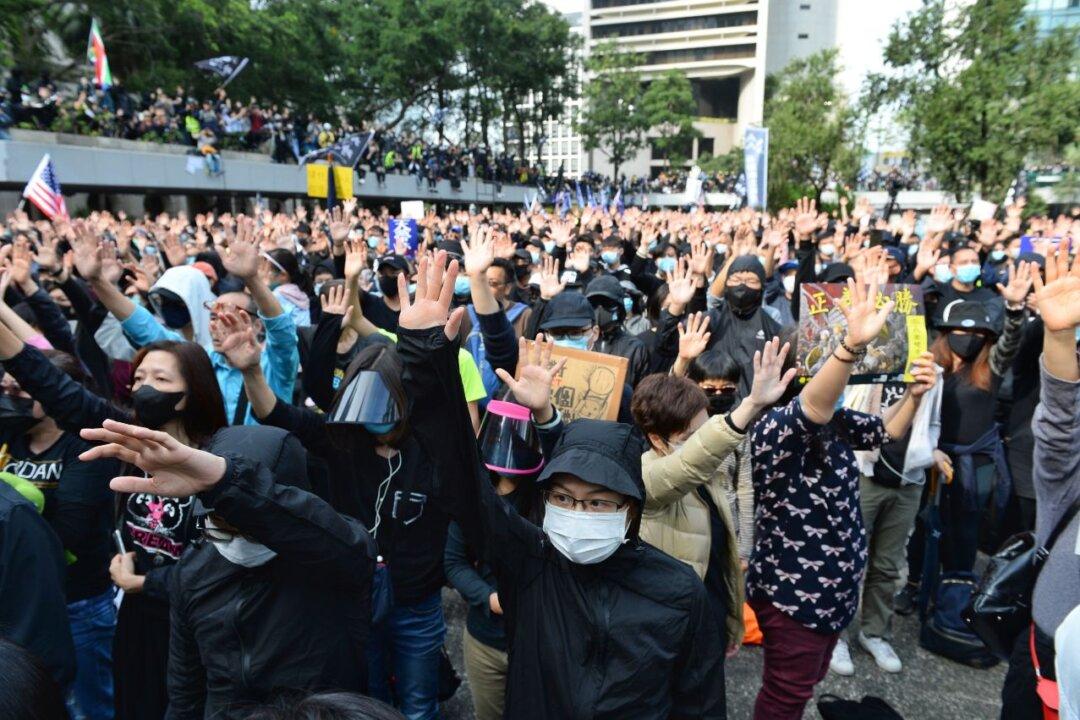Thousands gathered in downtown Hong Kong on Jan. 19, calling on international sanctions against Chinese Communist and Hong Kong officials who violate human rights.
The rally at Chater Garden, organized by local pro-democracy group Civil Assembly Team, was themed “2020 Karma to Commies, Universal Siege on Communists.”
Organizers told local media that roughly 150,000 people showed up at the peak of the rally. The police gave a far lower estimate of 11,680 people.
The group had planned to hold a march after the rally, going from Chater Road to Causeway Bay, but police rejected their application, citing safety concerns.
But the police-approved rally was abruptly called off early by police, who soon fired tear gas to disperse the large crowd gathered near Chater Garden.
The city’s Hospital Authority announced that seven people from Sunday’s protest events were sent to hospitals to treat injuries, ranging from 17 to 60 years old.
‘Banish the CCP’
Before the rally began at 3 p.m. local time, the Hong Kong bureau of The Epoch Times reported that police stopped and searched three young people dressed in black at Edinburgh Place, a few blocks away from Chater Garden. The three were eventually let go.
Hong Kong police also announced that it arrested four men in the nearby Central district, for possessing “offensive weapons” such as hammers, sticks, spray paints, and gloves, “for possible unlawful purposes.”
Civil Assembly Team organizer Ventus Lau denounced the police for questioning and searching people and journalists in areas near the rally. He said the police’s actions amounted to suppressing press freedom and the freedom of assembly.
Lau also called on attendees to have a new mentality in 2020, of not only attending protest events but also keep “resisting.”
Then, Italian tenor Stefano Lodola took to the stage to sing four protest-related songs.
At the rally, people shouted out slogans echoing their demands: “The Heaven Will Destroy the Chinese Communist Party (CCP),” “I Want True Universal Suffrage,” and “Banish the CCP, Liberate Hong Kong.”
Protesters also flew British and U.S. flags. One attendee held up a poster that read: “We are facing a bloody unelected government that absolutely refuses to listen to HK people, and only serves its master in Beijing, and we are saying ENOUGH OF THAT.”
Demonstrations against Beijing’s encroachment into the former British colony, which was returned to Chinese sovereignty in 1997, first ignited in June over an extradition bill that would the Chinese regime to transfer individuals for trial in mainland China. Their demands have since broadened to include calls for free elections and an independent investigation into police use of force against protesters.
A protester who identified himself as K, told The Epoch Times’ sister media NTD that he was concerned that Hong Kong police have become more aggressive and beaten protesters—not just the more aggressive protesters who are at the frontlines, but also those who are nonviolent.
A female student, T, urged other countries to pay more attention to what’s happening in Hong Kong and listen to the protesters’ demands.
Similar rallies were held in 22 cities in 12 countries, including the United States, Canada, and Australia on Jan. 19. The global-coordinated effort was aimed at calling on governments around the world to pass laws similar to the United States’ Hong Kong Human Rights and Democracy Act, which allows for sanctions, such as freezing assets and denying entry, on Hong Kong and Chinese government officials who have violated human rights.





